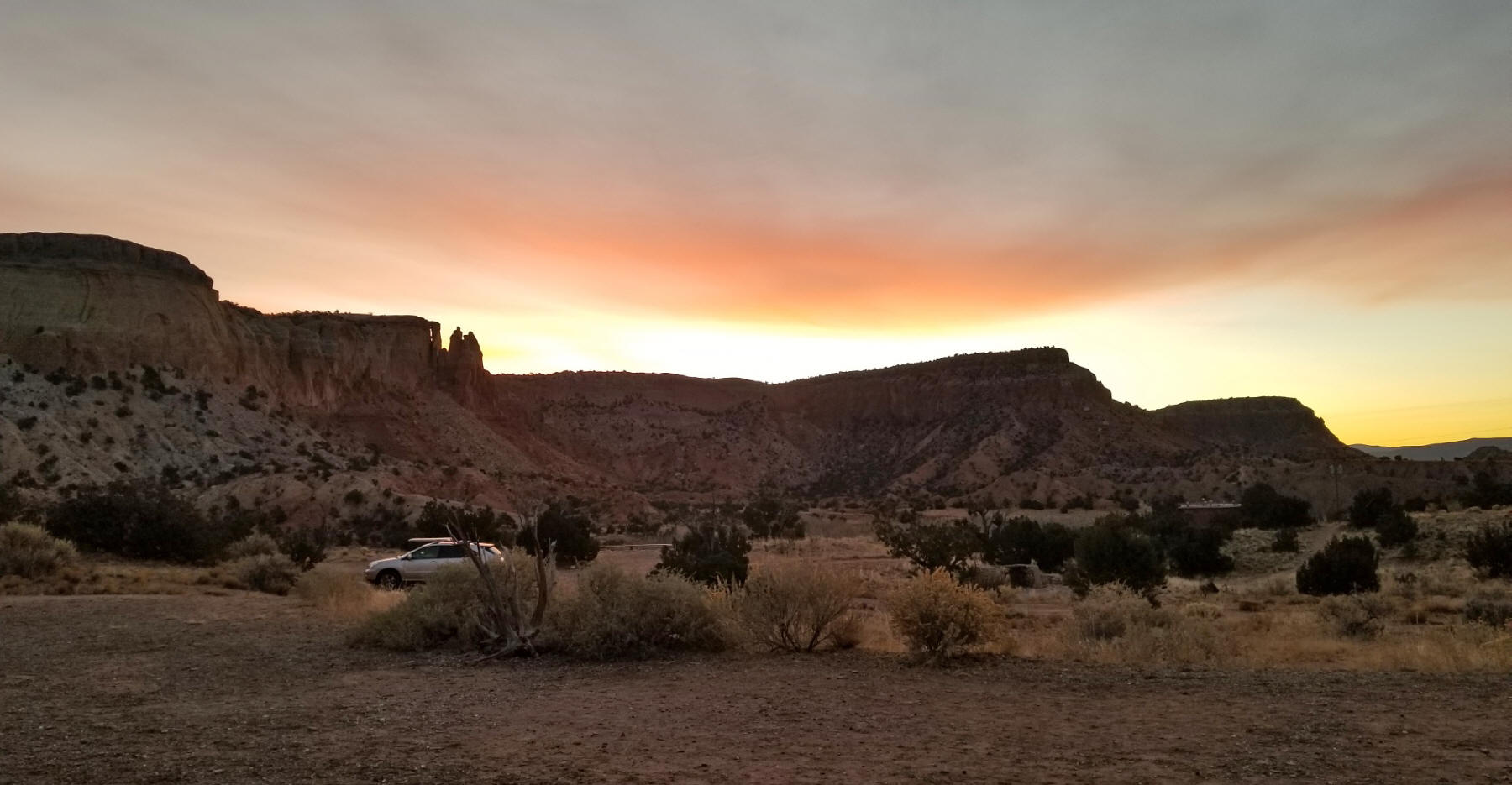Cajun Culture in Lafayette
Story and photos by Kathleen Walls
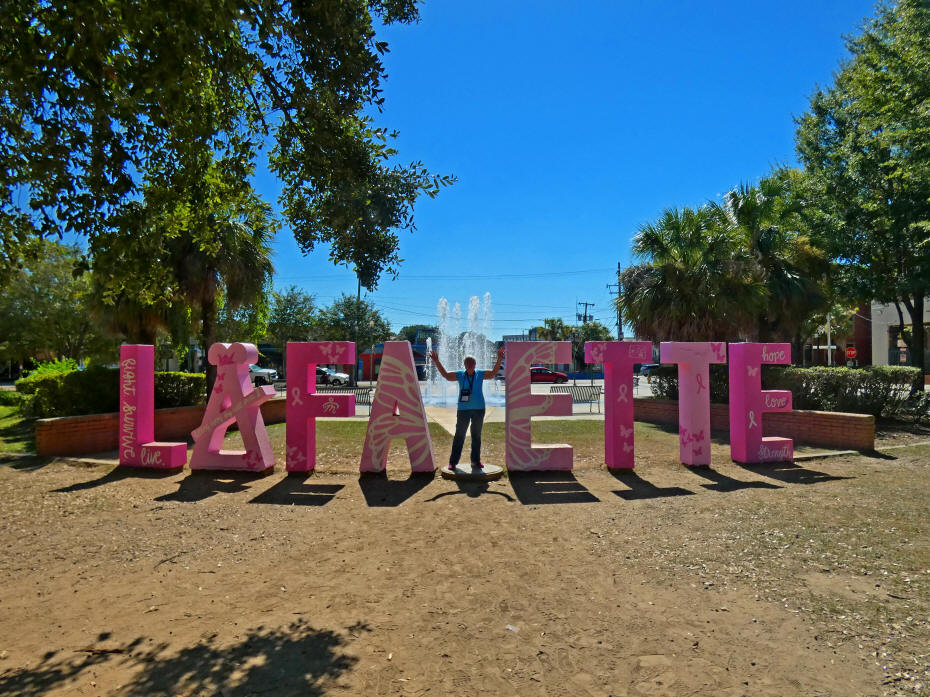
Lafayette, Louisiana traces its
roots to the 1750s and 1760s, when thousands of French
Canadians were forced from their homes by the British
during the French and Indian War. This event, known as
Le Grand Derangement, led to the displacement of the
Acadians, whose name eventually evolved into "Cajun."
The Acadians brought their French-Canadian heritage
with them, but in Louisiana, their culture blended
with existing traditions, forming what is now
celebrated as Cajun Culture. This melding of
influences is evident in Cajun music, which features
the German accordion, French fiddle, Spanish guitar,
and African instruments like the triangle, rub board,
and spoons.
The cultural fusion extended to
food as well. German sausage influenced the creation
of boudin, while African okra became a staple of
gumbo. Today,
Lafayette
is recognized as the hub of Cajun culture, renowned
for its history, music, and cuisine.
Freetown: A Historic District
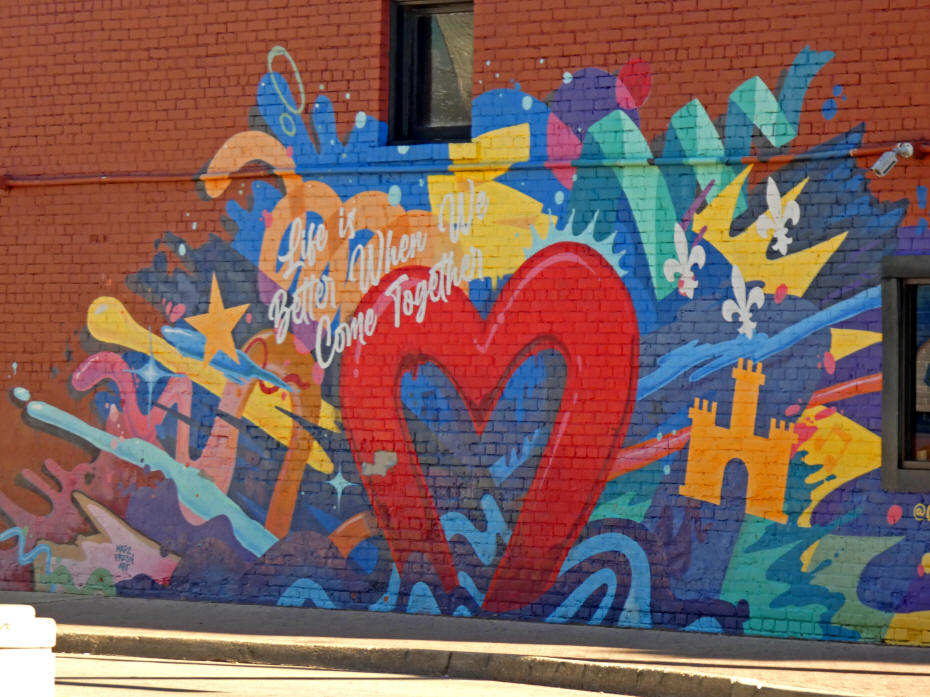
Just outside downtown Lafayette
lies Freetown, an area settled around the Civil War
and recognized as a historic district since 2016.
Originally home to free people of color, Freetown
became a vibrant community that included Africans,
Lebanese, Acadians, Spanish, Greeks, and other working
people, reflecting a diversity not always seen outside
New Orleans. The mural saying "Life is better
when we come together" is just outside Freetown but
exemplifies its culture.
Vermilionville
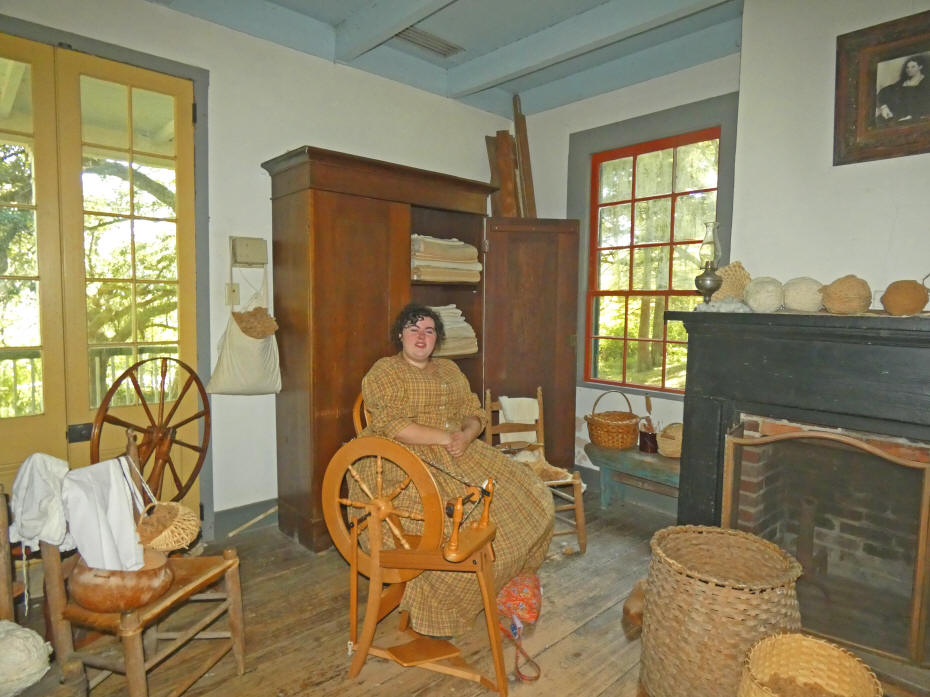
Vermilionville Historic Village
immerses you in Louisiana's past with a
recreated Acadian village dating from 1765 to 1890.
The site offers authentic Acadian homes and recently
opened a new brewery.
On my latest visit there, Ivy, out guide, began a
conversation with the docent doing the spinning which
was done by the oldest unmarried daughter in the
family. It hit me that is where the word "spinster"
originated.
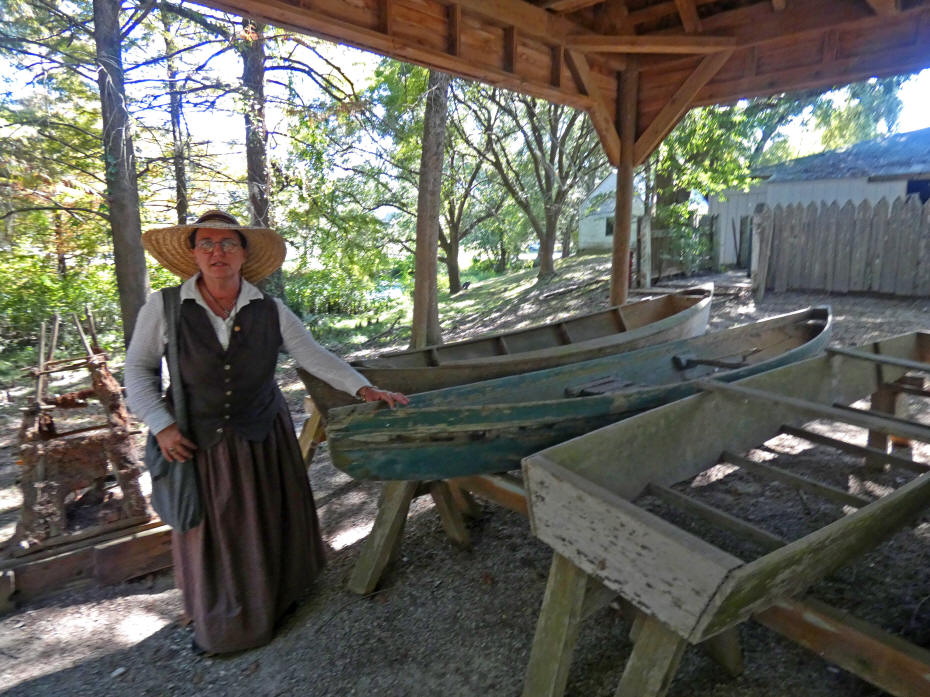
At L'Ecole, a reproduction of an
1890s Cajun schoolhouse, a docent discussed the
evolution of Cajun words and their differences from
traditional French. The early 1900s saw efforts to
suppress Cajun culture, with children forbidden to
speak French and adults ridiculed for doing so.
Fortunately, Cajun pride is now resurging. Traditional
crafts continue, with quilters, blacksmiths, and boat
builders demonstrating age-old skills.
La Maison Coussan, built around
1850, exemplifies typical Cajun and Creole homes,
constructed of cypress and insulated with bousillage, a
mix of Spanish moss and mud.
Carrying on the music tradition there is a Cajun Jam in the
Performance Center of Vermilionville every Saturday from 11am to 2pm. Local
musicians come and
play Cajun and Creole music.
Art and Culture
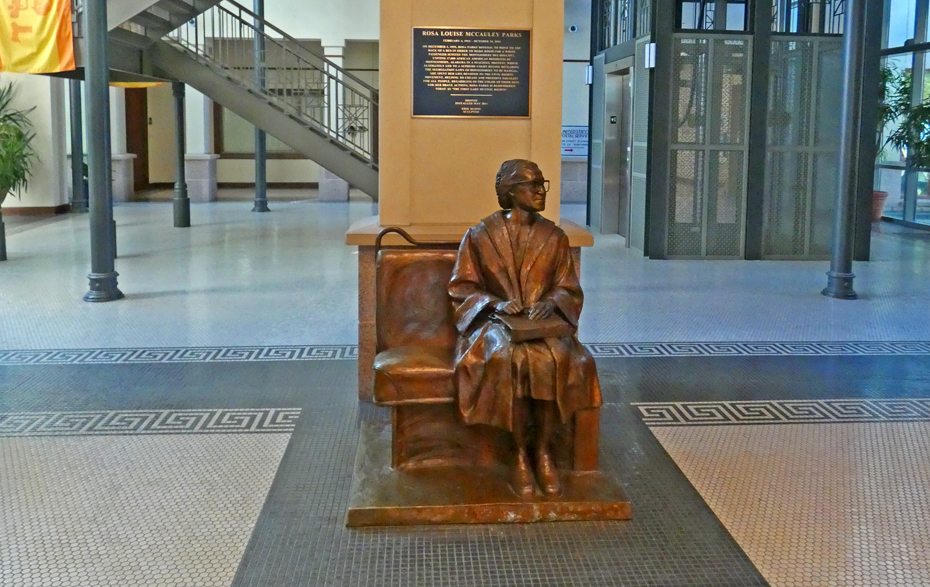
Lafayette has Art Walks every
second Saturday but any day, it's allover the city.
The bus and train station called the Rosa Parks Center
has a statue you'll want to see.
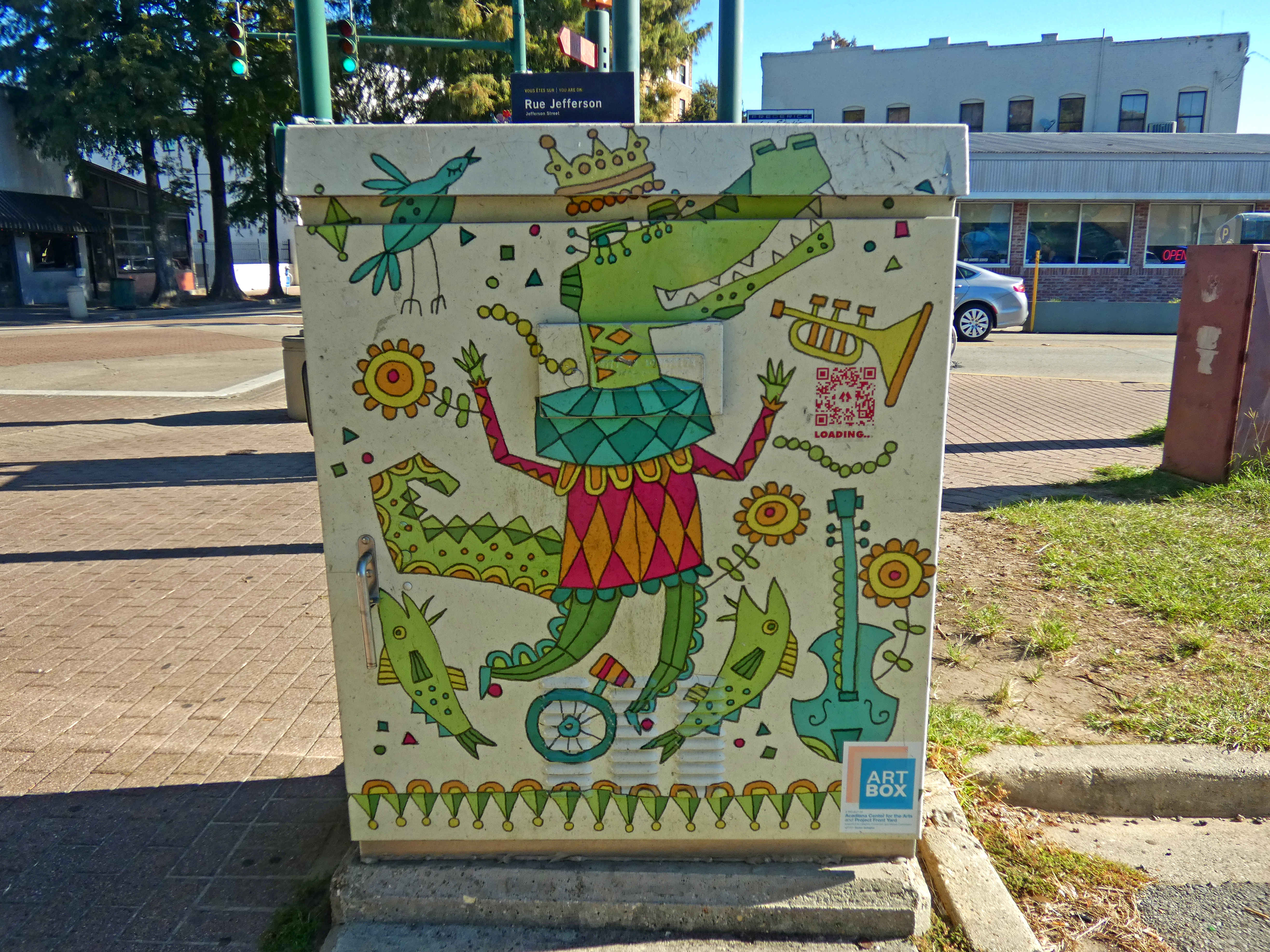
Acadiana Center for the Arts has
supported Murals and unique Artboxes, traffic signal
boxes that feature original artwork recognizing
Lafayette's culture, printed on high-quality vinyl
wraps, around the city.
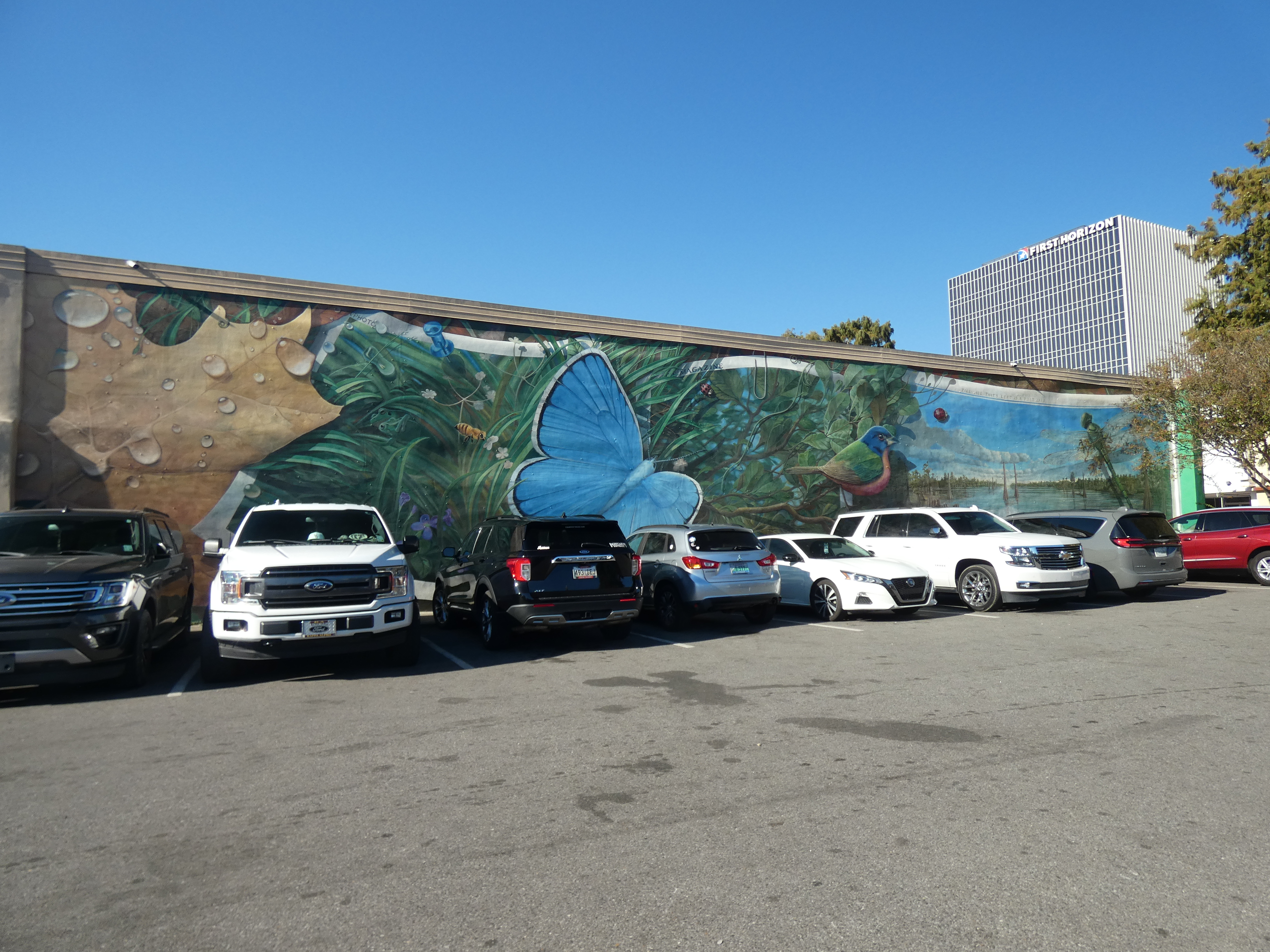
There are so many mural, you can
take a
mural walk. Many of the murals are by Robert
Dafford, a local muralist. One of my favorites is
Til All That's Left is a Postcard, showing a
butterfly, bird, a mosquito hawk, and a cypress swamp.
It was
originally painted 1984 and recently retouched.
Interestingly I was in Paducah, Kentucky recently and
admired his murals on the floodwall.
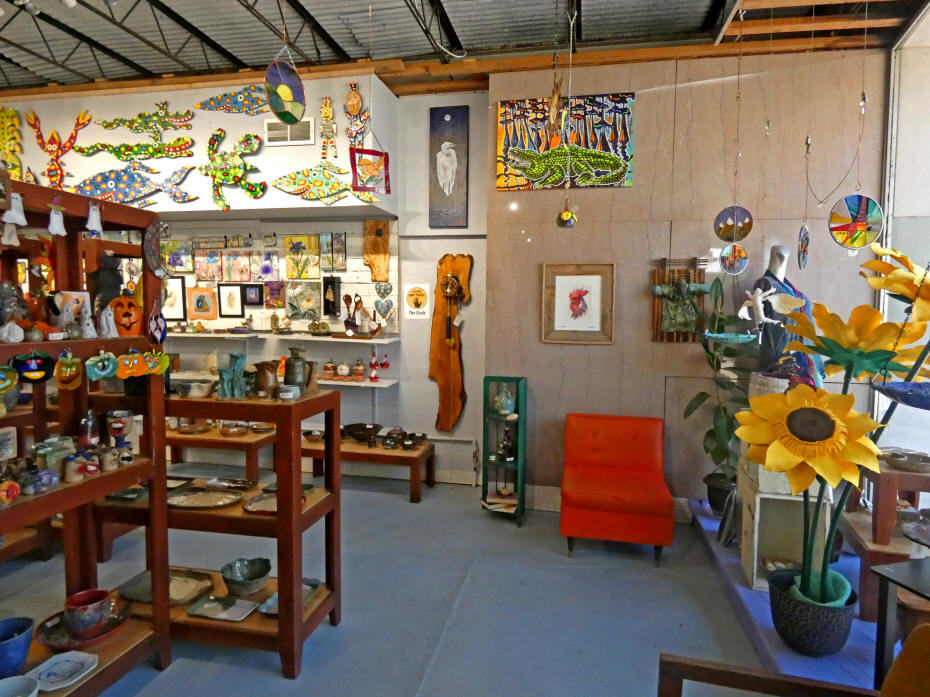
Sans Souci is one of Lafayette's art galleries.
Their artists are all the members of the
Louisiana
Crafts Guild. I was amazed at the variety of art
there from painting to pottery, jewelry and many other
types of crafts.
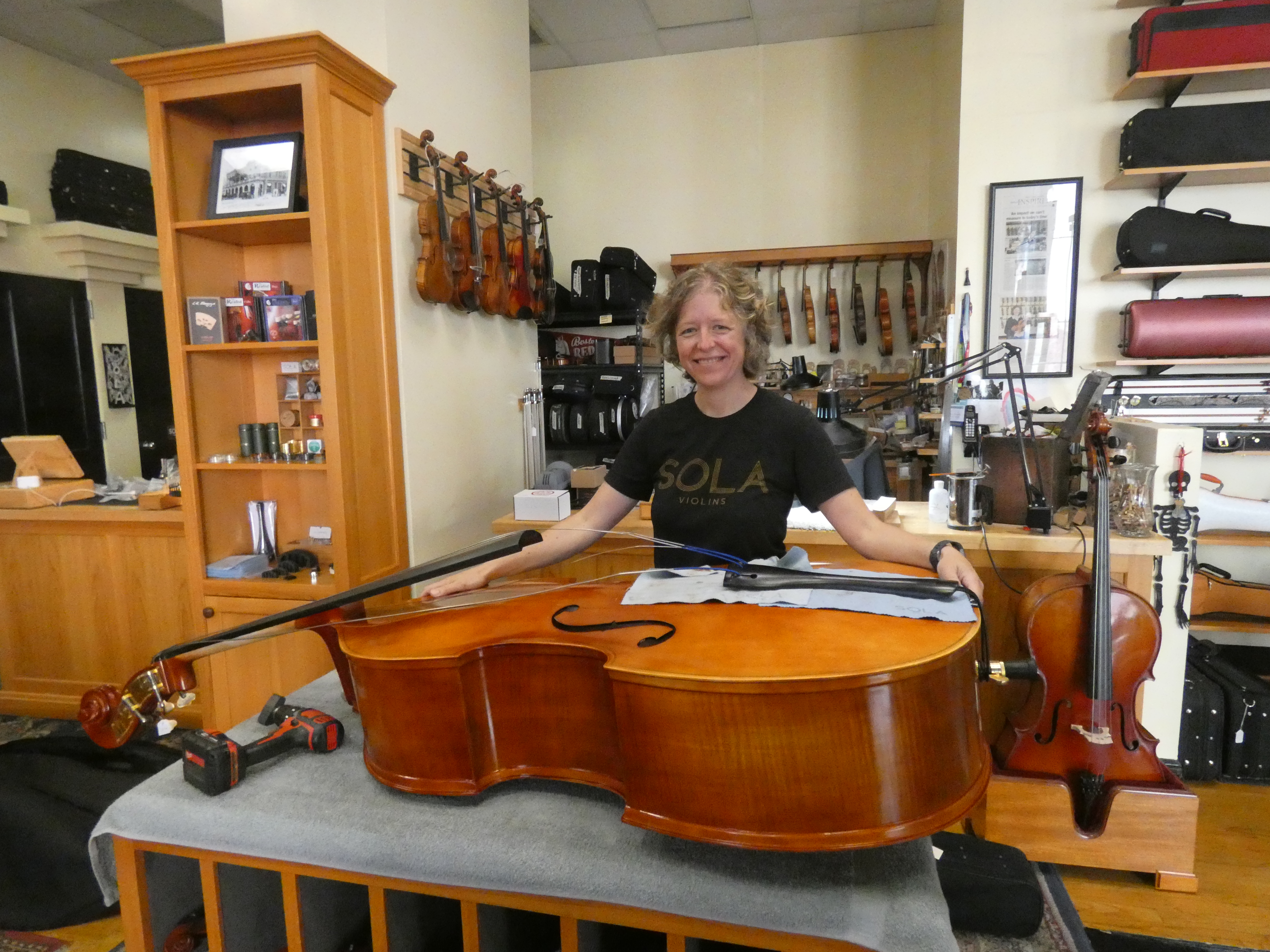
Music is celebrated in Lafayette
as well and visual arts. We stopped in at
Sola
Violins and met Anya Burgess, a violin maker and
Grammy-nominated fiddle player who creates beautiful
violins at her shop. She
also has performance on Monday night something inside
the store and sometimes larger events in the atrium
just outside her door.
Don't miss the
Paul and Lulu
Hilliard University Art Museum. Barbara led us
through many of the revolving exhibits. She told us,
"For the first time ever they have all women artists
in the museum exhibits."
An exhibit by Mare Martin, an
artist from Opelousas, Louisiana, was featured when I
visited. It's Beyond the Botanical. Martin is
known for her art that is deeply inspired by nature
and gardening as this one reflects.
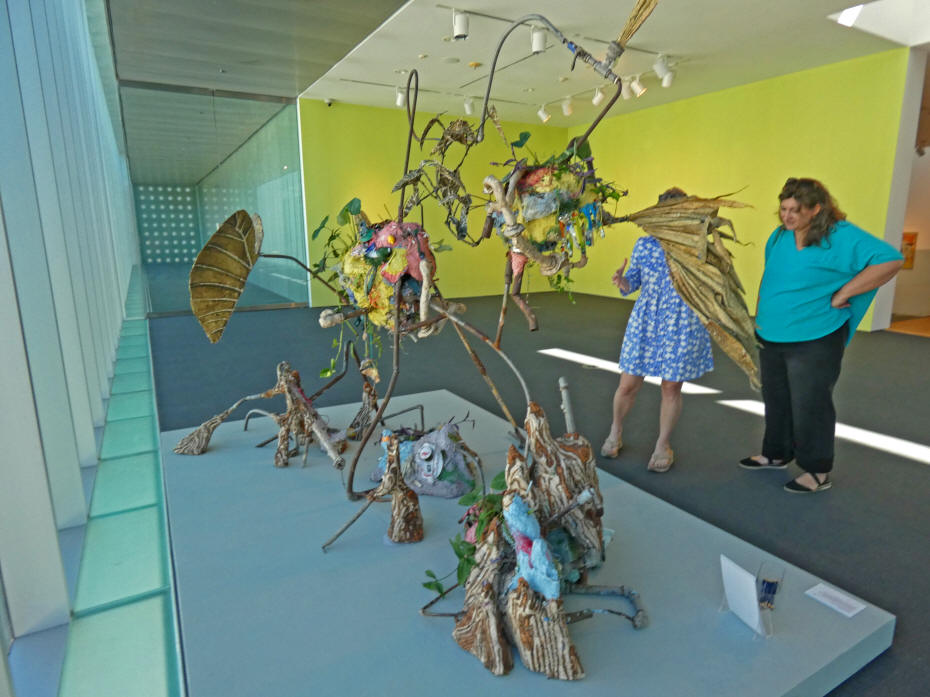
They do have some
permanent exhibits. Fragile Matter, a
combination of art and nature by three artists, Manon
Bellet, Hannah Chalew, and Harriet Joor combine real
plants with art. Barbara describes the works of the
project as an, "Amazing system where we water it up
here and it funnels down."Pointing to plants at the
bottom, "We don't water those, it drips through. And
so you can see the cypress knees."
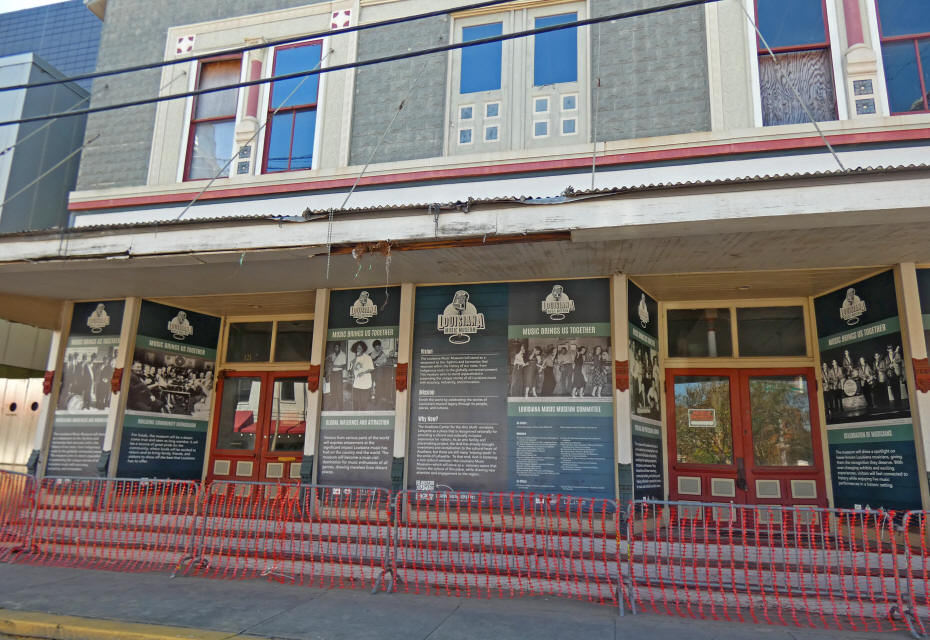
There's a
Louisiana Music Museum in the works that will be
housed in one of the oldest buildings in the state.
Lafayette Acadian Cultural
Center
At Lafayette
Acadian Cultural Center, you learn about Le
Grand Derangement, the exile that created the
culture of south Louisiana. In the late 1750s,
thousands of Arcadians driven out of Nova Scotia,
Canada during the French and Indian war. They were
welcomed in Catholic Spanish-owned Louisiana.
Henry Wadsworth Longfellow's poem Evangeline tells
how family and loved ones were torn apart when the
Arcadians were loaded onto ships taking them out
of Canada. Evangeline and Gabriel were engaged and,
after the deportment, she spent most of her life
searching for her lost love. In real life, Gabriel had
already married someone else by the time she found
him.
Lafayette Museum
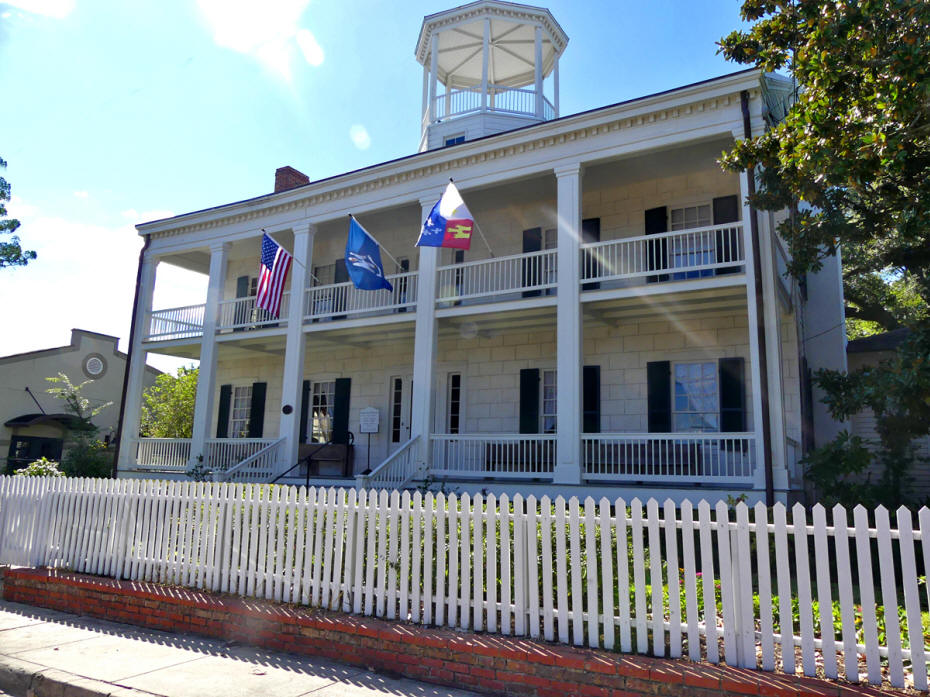
For more of Lafayette's history, Jean Mouton,
founder of Lafayette, built what is now the Lafayette
Museum as his Sunday home in the early 1800s for when they attended church.
The family lived far out of town and this was close to
the church.
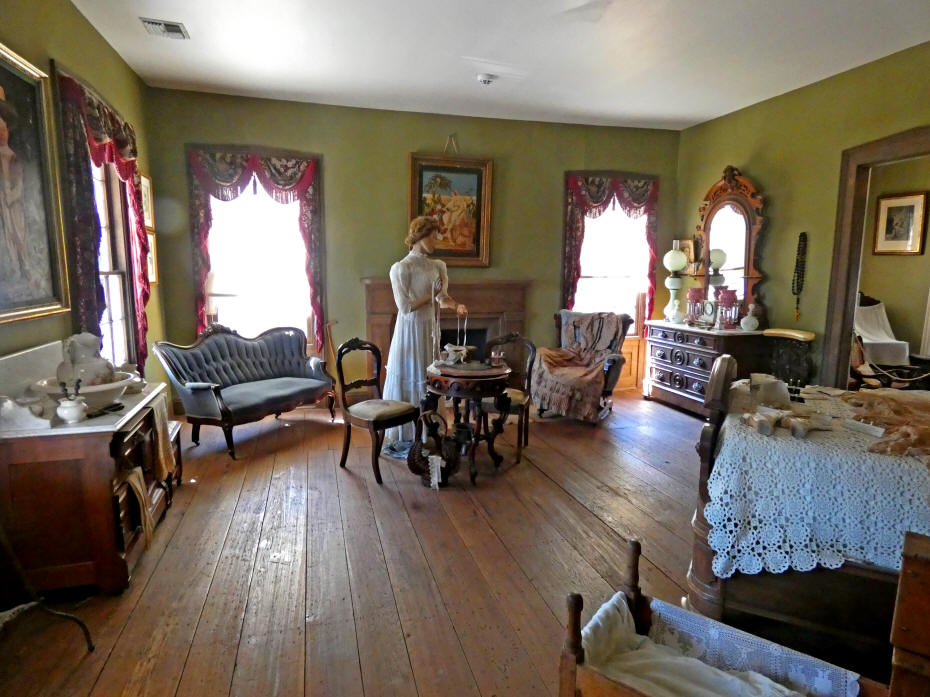
It was
later the home of his descendant, Alexandre Mouton,
Lafayette's 11th governor, and first Democrat to hold
the office. It's furnished in the style of the 1850's.
I particularly loved the detail of the furnishings. A
tiny kitten curled on a chair looks so real, I wanted
to pet it. The gold sofa is gorgeous. You can take a
self-guided or guided tour.
Tabasco Factory
.JPG)
We toured the facility where they make
Tabasco sauce and visited a museum that tells the
history of Avery Island. Edmund McIlhenny married into
the Avery family. He founded the McIlhenny Tabasco
Company in 1868 using seeds of Capsicum
frutescens peppers originally from Mexico or Central
America. He named his sauce "Tabasco," from a
Mexican-Indian word meaning "place where the soil is
humid."
The fifth generation of
McIlhenny's still owns and runs the Tabasco factory.
Tabasco is one of only 850 companies around the world
that hold a royal warrant of appointment certifying
the company as a supplier to Queen Elizabeth II. I
assume it still holds for King Charles. There are many
varieties of the hot sauce and other Tabasco products
they make.. In the gift shop, I sampled the
Raspberry Chipolti Ice Cream . We got a taste of their
many sauces when we dined in their restaurant, 1868.
Jungle Gardens
.JPG)
Ned McIlhenny traveled around the world. He loved
the various plants and trees he saw, so he started the
garden on Avery Island in 1895. He created a raised
rookery for the endangered snowy egrets and called it
"bird city" We did the driving tour of Jungle
Gardens. We saw a few alligators soaking up
the sun and some ancient moss-draped oak trees. The
grounds are gorgeous.
Moncus Park.

Our guide, Mary Allie Hebert, led us around Moncus
Park. It was once part of the University of
Louisiana and used for agricultural research. Since
1920 it was known as "the Horse Farm." In 2005, the
university put it up for sale. It was doomed to be
another mall or golf course but two concerned
university seniors, Danica Adams and Elizabeth "EB"
Brooks launched the "Save the Horse Farm" campaign.
The community agreed and thanks to those concerned
citizens and Mr. Jim Moncus, who contributed the
initial funding, it's preserved as a community park.
It's beautifully landscaped with native plants, a
Veteran's Memorial, a children's playground with a
splash pool, hiking trails, a fishing pier, an
amphitheater, a dog park, the cutest little tree
house built from lumber from a horse barn that was on
the property. The tree house is accessed from a
boardwalk.
Orlando Mountain in the park is the highest
point in Lafayette at about 60 feet,
The park is also home to a farmer's market every
Saturday. It's so much more than a place to buy
produce. You'll meet artists ranging from jewelry makers
to authors with the Writers Guild of Arcadiana. Local
musicians do an informal jam session there.
One man
was playing the most unusual bass instrument I've ever seen.
It was made from a washtub. Of course, you'll find
food ranging from fresh veggies to Creole and Cajun
meals.
Cathedral of St. John the
Evangelist
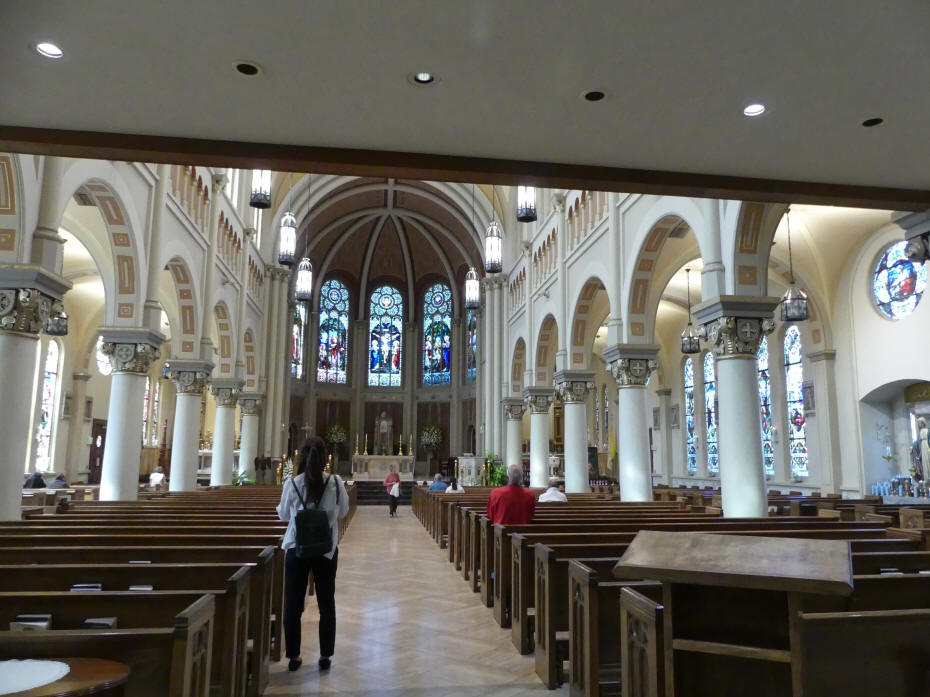
There has been a church on the site since 1821
when Jean Mouton donated land to the Catholic diocese.
The cathedral, built in 1916, is a stately Romanesque
Revival style with stained glass windows, oil
paintings, and statues of saints inside. It was elevated
from a church to a cathedral in
1918. Its Casavant Frères organ and elaborate
gold-toned altar are treasures.
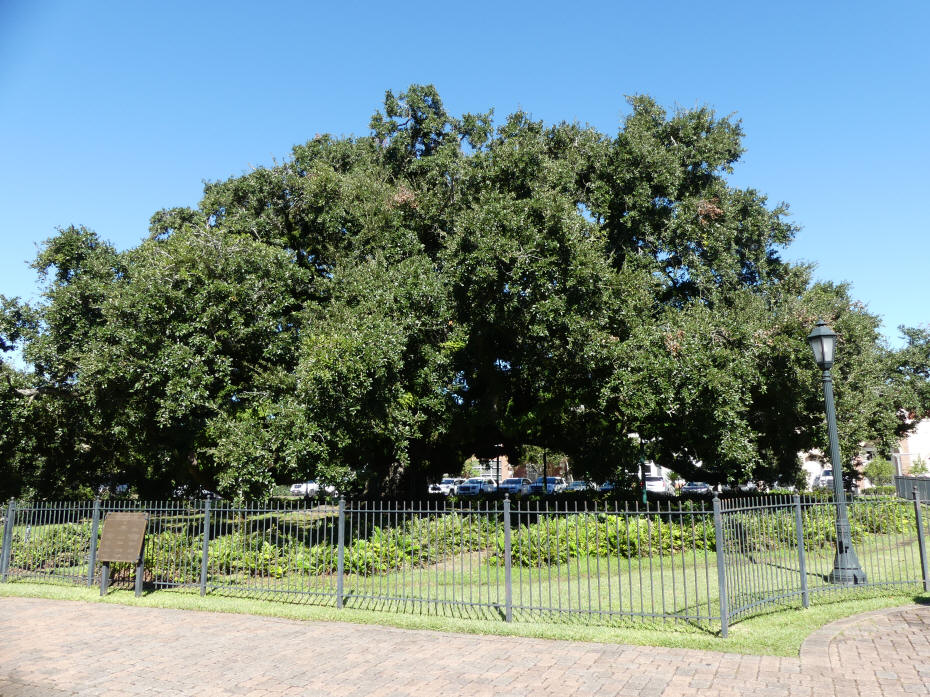
St. John Cathedral Oak next to the cathedral is one of the largest live oak trees in the United
States and is almost 500 years old.
Festivals
Lafayette
is big on festivals. They are celebrating something almost all the time. The largest event is
a five-day event held the last weekend in April called Festival
International de Louisiana, and there are many others

Festivals Acadiens et Créoles
We visited Lafayette a few years ago for the
Festivals Acadiens et Créoles, an annual
celebration of Cajun Culture held on the second week in
October. Instead of a ribbon cutting to open the festival, they
had a boudin cutting.
The live music is Cajun and zydeco music.
Roddie Romero & the Hub City Allstars opened the festival with
a tribute to Clifton Chenier, known as the King of Zydeco.
There are food tents as well from
many of the local restaurants. It's like taking a Cajun food
tour all in one place. We did a cooking class with Chef Kevin
Foil who taught us to make jambalaya.
Downtown Alive!
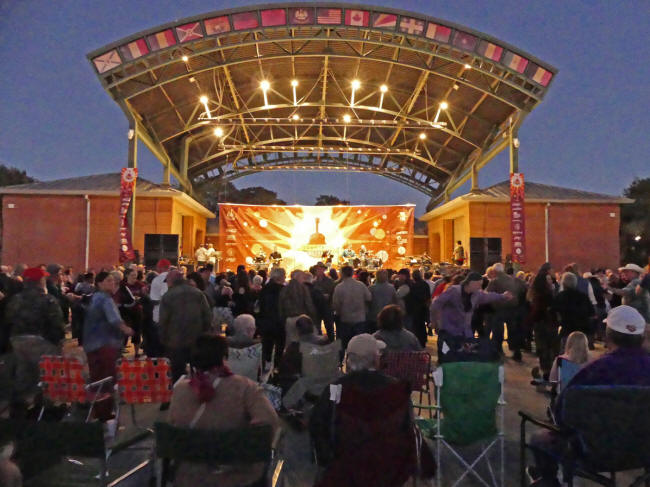
Their
Downtown Alive! is a free concert held every Friday night in downtown Lafayette.
It started as a small street party on Friday, April 8th, 1983.
Blue Moon
.JPG)
Blue Moon
Saloon is one of those places it's impossible to describe.
It's like an old fashioned fais do-do, A traditional
Cajun social gathering with music and dancing. It's a dance hall
that is a celebration
of Cajun and Zydeco music, an indoor/outdoor mix with a hostel
thrown in.
It's part back yard and part under a
shelter and always packed tight. You wend your way through
the crowd to the bar. Then head for the
bandstand where things are jumping. The last time I visited
Amis du Teche was playing. The band is led by two young women,
Adeline Miller, fiddler and vocalist, and Amelia Powell,
guitarist and vocalist, backed by Adeline's brother on bass and
a drummer with a driving beat. You can't stay still when they
play.
Dining

Rock n' Bowl
is one more fun thing to do in Lafayette. It's a
combination of dining, dancing, and bowling alley. The original
one was opened in New Orleans but during Hurricane Katrina, the
owner evacuated to Lafayette, fell in love with the city, and
opened a branch here.
.JPG)
Bayou Teche Brewing mixes a Sunday Zydeco Brunch
with music, delicious pizzas, and craft beer that will
get you dancing. The band, John Wilson and the
Zydeco House Rockets, even invited one of our group to
play the fretboard with them when we visited.
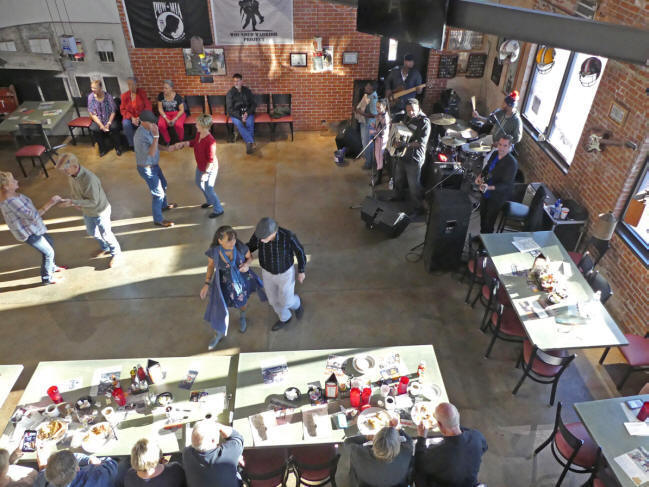
A popular tradition is a Zydeco breakfast or brunch.
At Breaux Bridge, the Crawfish Capital of the World, Buck
and Johnny's Zydeco Breakfasts, bands like
Chubby Carrier and The Bayou Swamp Band gets Cajuns and
visitors together on the dance floor doing the two-step while
they dine on breakfasts like Don't Mess with my Tasso and Swamp
Rice.
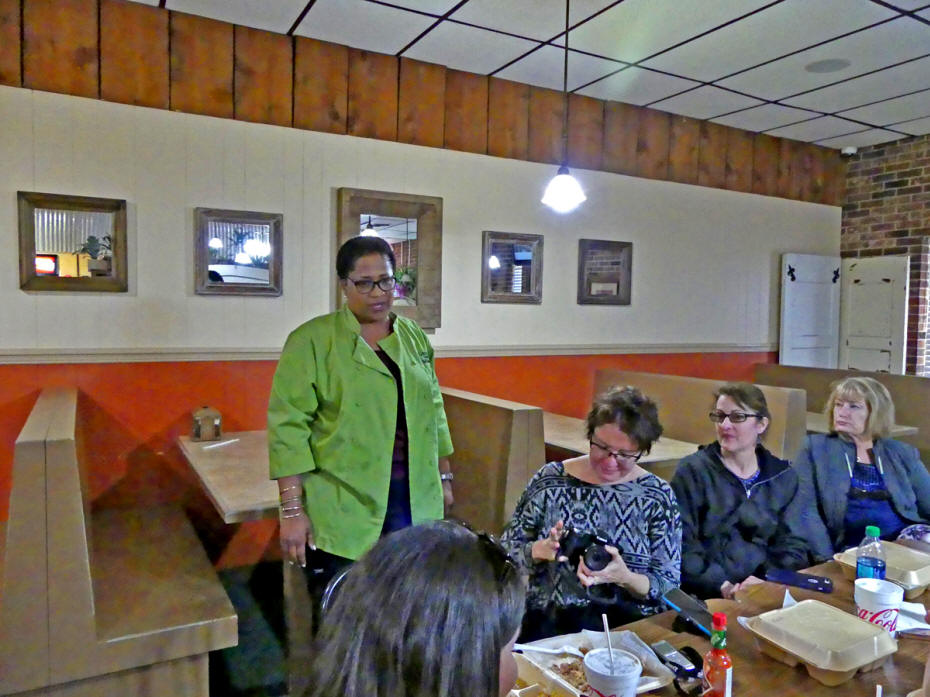
Creole culture is represented at Laura's
II. Owner, Madonna Brussard, based it on a
small restaurant her grandmother founded. The most
popular specials are the Turkey Wings and the Fried
Pork Chops. I met her again on my most recent trip to
Lafayette.
.JPG)
Spoonbill Watering Hole and Restaurant was
once a gas station. It still keeps a lot of the
signage, but the food is much better than gas station
stuff.
.JPG)
Romancelli Bistro e Vino offers elegant
Italian mixed with Cajun dining with wine pairings. It
has a new Orleans French Quarter feel. I
loved my Shrimp Scampi, and the chocolate cake is to
die for.

Johnson's Boucaniere has been processing
boudin and smoked meats as a family tradition dating
back to the 1930s.
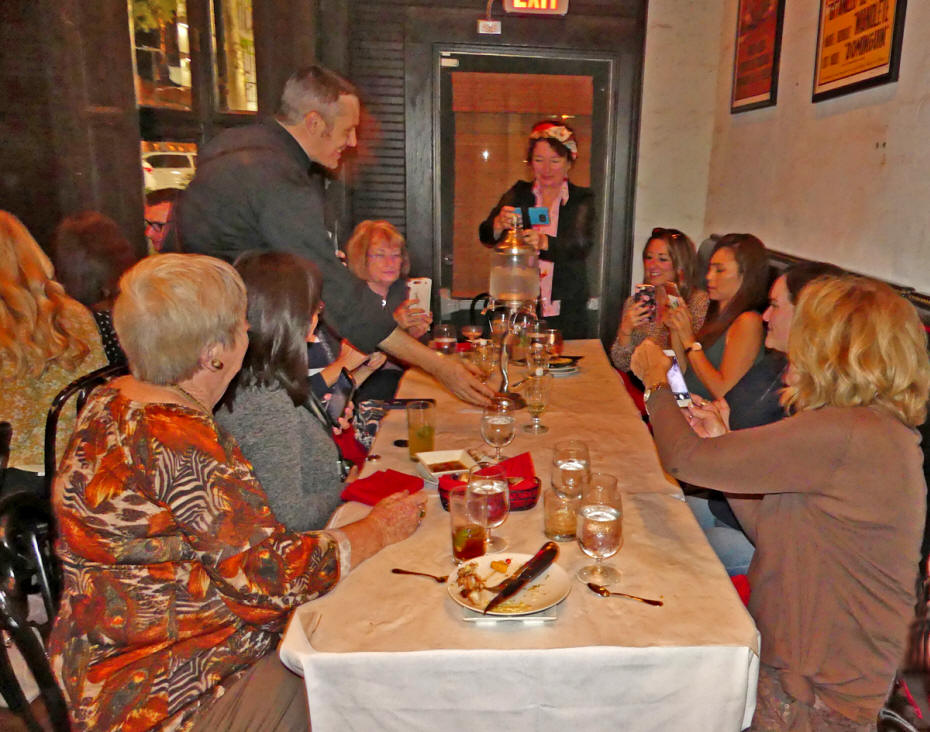
Pampalona Tapas Bar is one of the
restaurants where that serve a more Spanish cuisine
with just a hint of Cajun. One unusual drink special
is Absinthe, a licorice-tasting green drink once
banned.
.JPG)
The French Press's Chef Justin Girouard was
nominated for a James Beard award. I enjoyed French
Toast with cream cheese and banana filling and topped
with a berry/champagne compote. This one also had a
French Quarter feel.
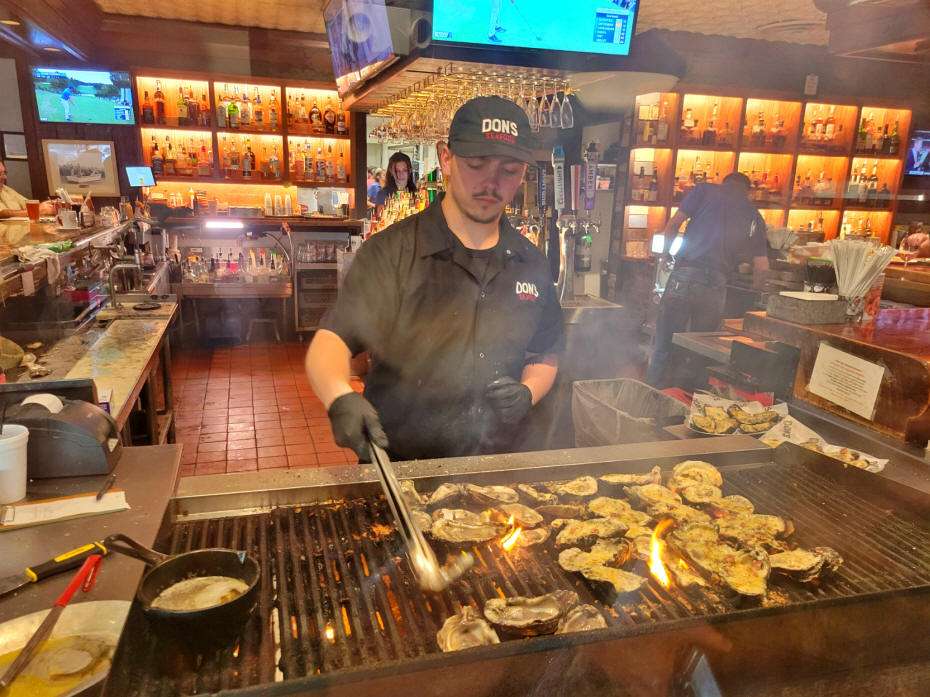
Don's Seafood serves fresh, local seafood
Cajun style. I had the boiled shrimp and my friend had
the fired and we were both happy and stuffed. We
watched then cooking oysters in the half shell and I
wished I had room for one more bite to sample those
oysters.
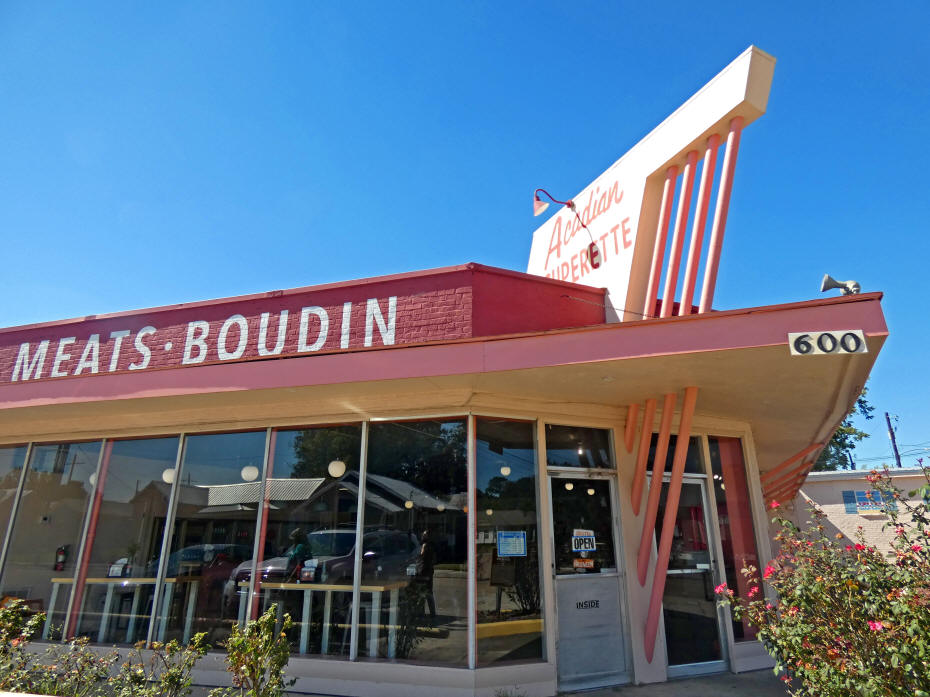
Acadian Superette is a local hangout in Freetown
that specializes in smoked meats and traditional Cajun
food. I had a tasty Shrimp Po' Boy.
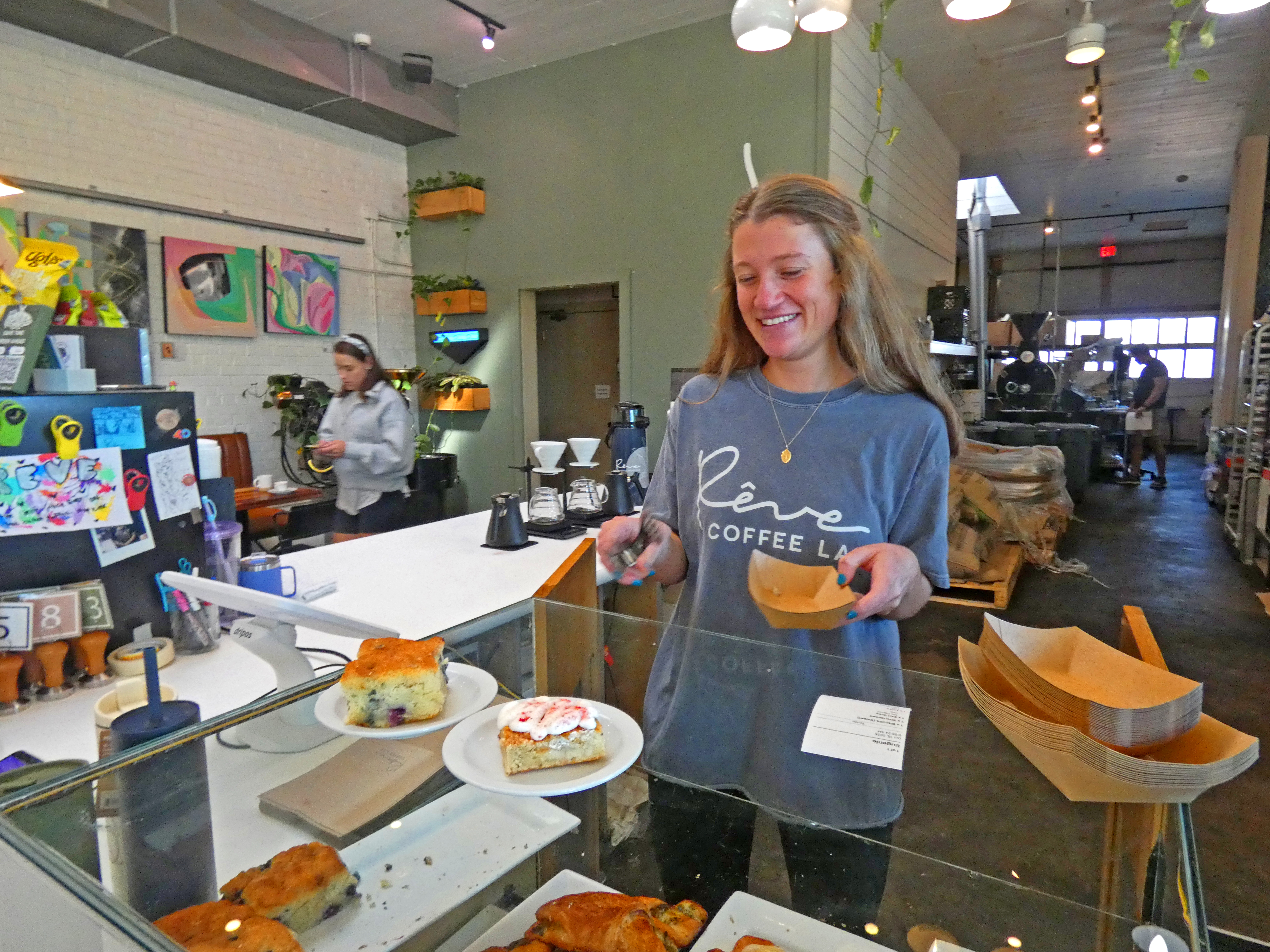
Reve Coffee Lab
is a coffee lovers dream and the offer some tasty
pastries as well.
Central Pizza for great pizza and more, and Sunday's
Soda Fountain, for an old-fashioned soda
fountain experience, are two other downtown
restaurants worth trying.
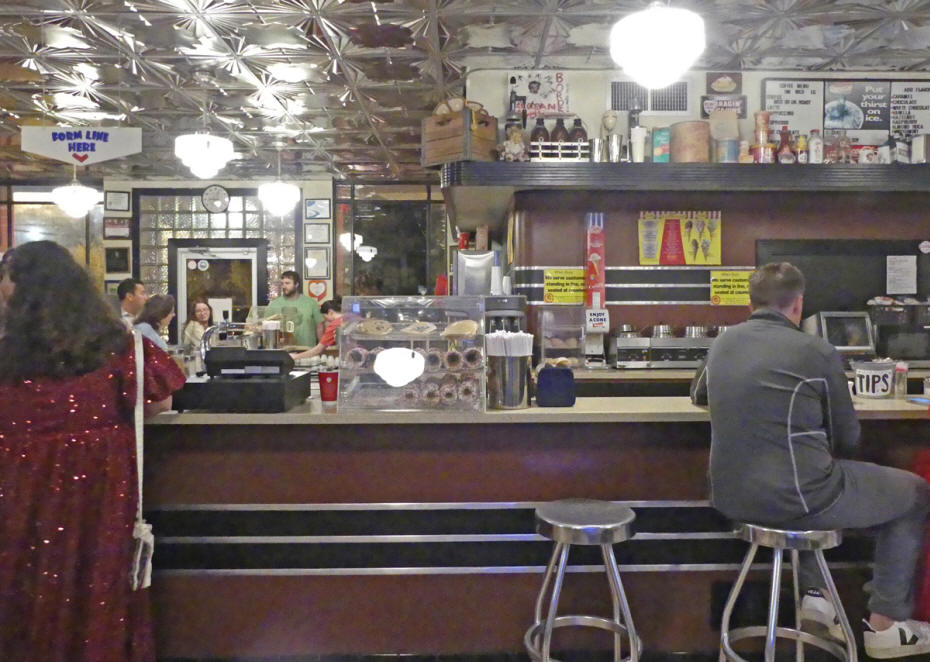
Borden's has their last remaining ice cream
parlor located in Lafayette. It dates to 1940.
I've visited Lafayette many times and this story
is a mix of my experiences there. To see and do all of
these places, allow yourself at least a week. Two is
even better.
Public
Disclosure Please Read FTC has a law
requiring web sites to let their readers know if any of the
stories are 'sponsored' or compensated. We also are to
let readers know if any of our links are ads. Most are not.
They are just a way to direct you to more information
about the article where the link is placed. We have several ads
on our pages. They are clearly marked as ads. I think
readers are smart enough to know an ad when they see one but to
obey the letter of the law, I am putting this statement here to
make sure everyone understands. American Roads and Global
Highways may contain affiliate links or ads. Further, as their
bios show, most of the feature writers are professional travel
writers. As such we are frequently invited on press trips, also
called fam trips. On these trips most of our lodging, dining,
admissions fees and often plane fare are covered by the city or
firm hosting the trip. It is an opportunity to visit places we
might not otherwise be able to visit. However, no one tells us
what to write about those places. All opinions are 100% those
of the author of that feature column.

